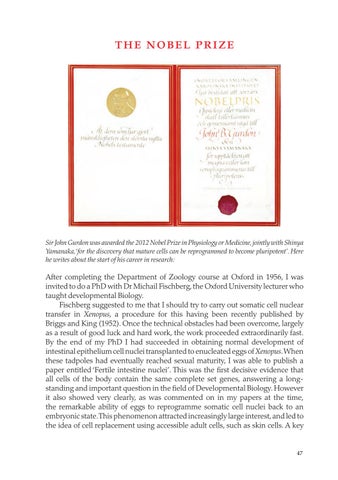the nobel prize
Sir John Gurdon was awarded the 2012 Nobel Prize in Physiology or Medicine, jointly with Shinya Yamanaka,‘for the discovery that mature cells can be reprogrammed to become pluripotent’. Here he writes about the start of his career in research:
After completing the Department of Zoology course at Oxford in 1956, I was invited to do a PhD with Dr Michail Fischberg, the Oxford University lecturer who taught developmental Biology. Fischberg suggested to me that I should try to carry out somatic cell nuclear transfer in Xenopus, a procedure for this having been recently published by Briggs and King (1952). Once the technical obstacles had been overcome, largely as a result of good luck and hard work, the work proceeded extraordinarily fast. By the end of my PhD I had succeeded in obtaining normal development of intestinal epithelium cell nuclei transplanted to enucleated eggs of Xenopus. When these tadpoles had eventually reached sexual maturity, I was able to publish a paper entitled ‘Fertile intestine nuclei’. This was the first decisive evidence that all cells of the body contain the same complete set genes, answering a longstanding and important question in the field of Developmental Biology. However it also showed very clearly, as was commented on in my papers at the time, the remarkable ability of eggs to reprogramme somatic cell nuclei back to an embryonic state. This phenomenon attracted increasingly large interest, and led to the idea of cell replacement using accessible adult cells, such as skin cells. A key
47














